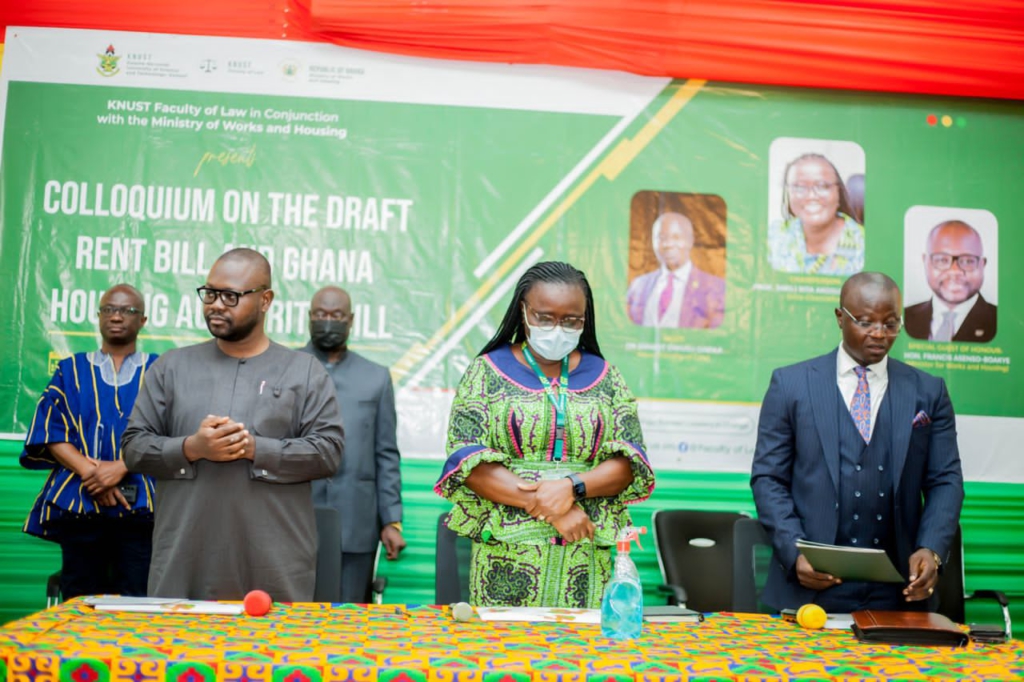Stakeholders in the housing sector have begun a review of the Rent Act 1963 (Act 220), which regulates renting and housing in Ghana.
According to the stakeholders, this will ensure sanity in the administration of rental housing and remove inherent constraints on housing supply in the country.
The stakeholders included industry players and persons from academia.
Speaking at a colloquium to review the existing Rent Act and the Bill for the establishment of the Ghana Housing Authority, the sector Minister, Francis Asenso-Boakye said reforming the existing legislation on rent will breathe a new life in rent administration in the country.

This he said will help promote a delicate balance between the needs of landlords and tenants in the face of rapid urbanization.
Acknowledging the importance of provision of housing to government developmental goals, Mr. Asenso-Boakye stated that the reforms will help increase access to housing by the ordinary Ghanaian.
He added that the new Act should be able to “safeguard the rights of vulnerable tenants who have been out-priced by the uncontrollable hikes in the cost of rental accommodation”.
Touching on the need to put in place institutional architecture to drive the housing sector, he further explained that the establishment of the proposed Ghana Housing Authority will be key in the country’s ability to regulate, plan, develop and manage housing development.
“There must be concerted efforts to address the current precarious situation in the housing sector where home ownership has become a very complex and expensive venture for most Ghanaians”, he noted.

Speaking at the colloquium, the Chairperson and Vice-Chancellor of the Kwame Nkrumah University of Science Technology, Professor Mrs. Rita Akosua Dickson described the colloquium as a national assignment that will open avenues to set up key priorities and develop concrete plans of actions based on detailed international comparative analysis.
She therefore entreated the panelists who were carefully selected among policy makers, academicians and experts, landlords, tenants, rent control officers, lawyers, judges, experts in the built industry and other key interest groups to be measured, candid, objective and accurate in their submissions.
Professor Dickson further expressed optimism that the deliberations will produce stimulating and invigorating inputs for the needed reforms in the rent law as well as the Ghana Housing Authority Bill.
The relevance of the existing law as amended and passed by Parliament some fifty-nine years ago has been outlived by the current population growth, urbanization and demand and supply imbalance.
This situation has saddled the rental housing industry with huge challenges with landlords demanding years of advance rent.
Latest Stories
-
Police arrest suspect exposed by CCTV footage
1 hour -
The presidential feud that even death couldn’t end
1 hour -
Hundreds of Voice of America reporters fired as Trump guts outlet
1 hour -
Gov’t directs NACOC to operationalise Substance Use Disorder Rehabilitation Fund
2 hours -
TDC Board tours project sites, reviews progress and future development plans
2 hours -
Navrongo traditional leaders urge Mahama to intervene in looming chieftaincy crisis
2 hours -
Iran–Israel war: Dissecting Netanyahu’s political calculus
2 hours -
When Algeria came to Iran’s aid
2 hours -
‘Retired but not tired’ – Stakeholders celebrate COP Samuel Alfred Winful’s distinguished service
3 hours -
GWCL official dismisses claims of sabotage over uncommissioned Broto Water Project
3 hours -
Pakistan to nominate Trump for Nobel Peace Prize
4 hours -
Suicide bombing at Damascus church kills 22, Syrian authorities say
4 hours -
Bellingham scores as 10-man Real Madrid beat Pachuca
4 hours -
Three fans die in Algeria football stadium fall
5 hours -
South African engineers freed after two years in Equatorial Guinea jail
5 hours

